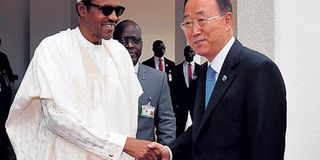Mixed report for Muhammadu Buhari as he marks 100 days amid attacks

President Muhammadu Buhari in Abuja with United Nations Secretary General Ban Ki-moon in this August 24, 2015 photo. AFP PHOTO
What you need to know:
- He has accused his predecessor of leaving the treasury ‘virtually empty’.
- He has yet to appoint Cabinet since taking office at the end of May.
LAGOS
President Muhammadu Buhari has shaken up Nigeria’s corrupt bureaucracy and intensified the battle against Boko Haram in his first 100 days, but has struggled to set out his vision for the faltering economy, say analysts.
The 72-year-old celebrates the landmark on Saturday, after taking office on May 29 on a wave of optimism for oil-rich Nigeria, which has Africa’s biggest population and economy but many deep and seemingly intractable problems.
He presented himself to the electorate as a hawk on security and an iron fist on corruption, pledging to recover “mind-boggling” sums of stolen oil money and vowing to crush the six-year Islamist insurgency that has killed at least 15,000 in the northeast.
The press has been largely supportive of Buhari in his first months, criticising his apparent preference for fellow northerners in his early appointments but comparing him favourably with the defeated Goodluck Jonathan, who had ruled since 2010.
“His predecessor spent over (five) years in office and never made half of the impact Buhari has made in three months,” political commentator Lawal Ogienagbon wrote last week in Lagos-based daily The Nation.
Mr Buhari’s vice-president, Yemi Osinbajo, has estimated the country’s debts at some $60 billion (54 billion euros) and said Nigeria’s economy is in its worst state in the country’s 55-year independent history.
Meanwhile Mr Buhari has accused his predecessor of leaving the treasury “virtually empty” as global oil shocks squeezed Nigeria’s crude-dependent finances, forcing government projects to be scrapped or halted and state employees to go months without pay.
In particular, President Buhari has expressed concern about oil sector fraud and the non-payment of federal revenues into government coffers since 2011 — but he maintains the situation can be turned around.
In an early sign that he was serious about graft, President Buhari sacked the entire board of state oil company NNPC, notorious for mismanagement and rampant theft, and installed a Harvard-educated lawyer to spearhead reforms as the new managing director.
But the former military ruler has yet to appoint a cabinet, indicating that he planned to leave the announcement of his ministers until September, and observers have voiced frustration at the slow pace of change.
“This has been viewed in a disappointing light, as the president was expected to be a more decisive leader than his predecessor,” Mr Ronak Gopaldas, a sovereign risk analyst at South Africa’s Rand Merchant Bank, told AFP.
The result, said Mr Gopaldas, has been a “marked reversal” in the goodwill from the business community Buhari enjoyed as he basked in the glow of his election victory.
“As a president who campaigned on a message of change, especially security and corruption, the big elephant in the room remains the economy, and clarity in this regard is sorely lacking,” Mr Gopaldas said.
“There are currently more questions than answers around what the policy impulse will be, clouding the outlook for both fiscal and monetary policy.”
On the military front, President Buhari scored points for dismissing the top brass in August and making a very public show of ordering his replacement chiefs of staff to stamp out Boko Haram within three months.
But this is a “near impossible” ambition, according to Andrew Noakes, coordinator of the Nigerian Security Network of analysts, and Buhari should instead be judged on his efforts to reorganise the government’s campaign against Boko Haram.
ATTACKS HAVE SPIKED
“In a short space of time he has made great strides by focusing attention on tackling the underlying causes of the insurgency rather than just its symptoms, by bringing new officers into senior positions in the military, and by relocating the military command to northeast Nigeria,” Noakes told AFP.
“Now we must wait to see whether these changes will pay dividends.”
Any assessment of Buhari’s success against Boko Haram has to acknowledge that attacks have spiked since he assumed office, in an apparent reversal of the gains made in Jonathan’s final weeks, says Ryan Cummings, chief security analyst with South African consultancy Red 24.
“That said, Buhari should be applauded for noting the importance of diplomatic relations in the fight against the sect and acknowledging this by visiting and strengthening ties with all parties to the Lake Chad Basin Commission,” formed by regional countries to control the use of water and other natural resources.





